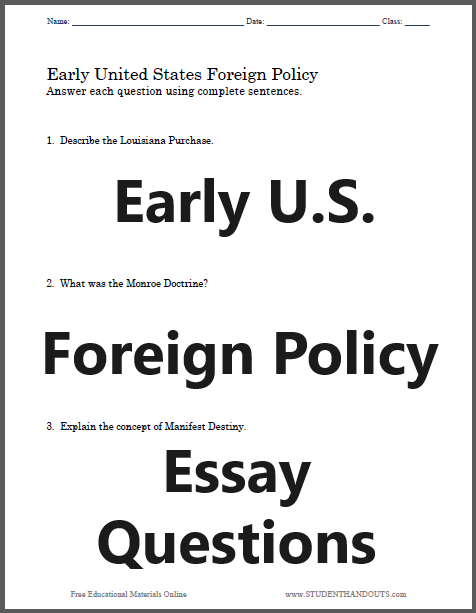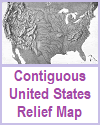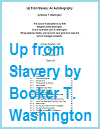| Early U.S. Foreign Policy Essay Questions |
|---|
| www.studenthandouts.com > U.S. History > Westward Expansion > Worksheets |
 |  |
|---|
|
Click here to print. Answers will vary. Questions: 1. Describe the Louisiana Purchase. 2. What was the Monroe Doctrine? 3. Explain the concept of Manifest Destiny. |
|---|
|
The Monroe Doctrine was a foreign policy declaration made by President James Monroe in his annual message to Congress on December 2, 1823. It is considered one of the most significant and enduring principles of U.S. foreign policy. The Monroe Doctrine had several key components and objectives.
Non-Colonization: The Monroe Doctrine stated that the United States would not interfere in the existing European colonies or conflicts in the Western Hemisphere. In return, it called for European powers to refrain from any further colonization or expansion in the Americas. Non-Intervention: The doctrine declared that any attempt by European powers to interfere in the affairs of independent nations in the Western Hemisphere would be viewed as a hostile act against the United States. Mutual Non-Interference: The United States pledged not to interfere in the internal affairs or conflicts of European nations and called on European powers to adopt a similar policy with regard to the newly independent nations in the Americas. Sovereignty of Independent Nations: The Monroe Doctrine emphasized the sovereignty of newly independent nations in the Western Hemisphere, particularly those in Latin America. It asserted that these nations had the right to determine their own governments and political destinies. Hemispheric Solidarity: While not explicitly stated in the original doctrine, the Monroe Doctrine conveyed a message of hemispheric solidarity among the nations of the Western Hemisphere, with the United States as a protector of these nations against European interference. The Monroe Doctrine was a response to perceived threats from European powers, particularly concerns that Spain and other European nations might attempt to reestablish their colonial control over newly independent Latin American nations. It also reflected a desire to prevent further European colonization in the Americas, which the United States saw as a potential threat to its own interests and security. Over the years, the Monroe Doctrine has been cited and invoked in various contexts and has influenced U.S. foreign policy in the Western Hemisphere. It has evolved and been adapted to changing international circumstances. While some aspects of the doctrine have been criticized or modified, its core principles of non-interference and sovereignty continue to shape U.S. relations with Latin American and Caribbean nations. |
|---|
| www.studenthandouts.com > U.S. History > Westward Expansion > Worksheets |









